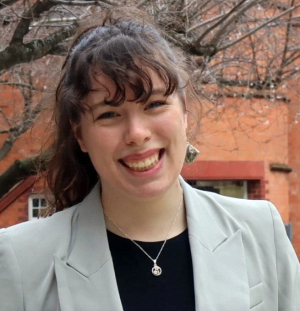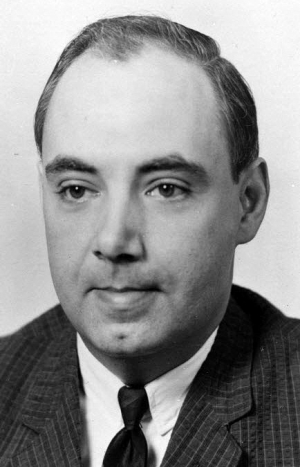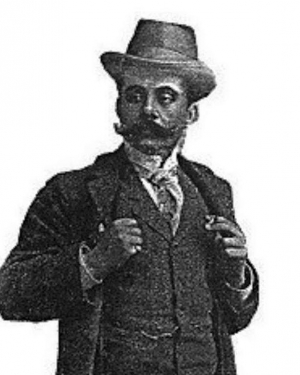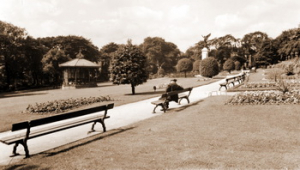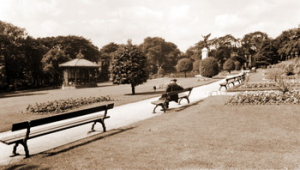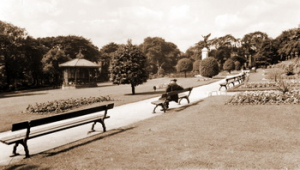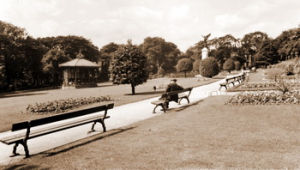
Chris Helme
Euday Louis Bowman (November 9, 1886 – May 26, 1949) was an American pianist and composer of ragtime and blues who represented the style of Texas Ragtime. He is chiefly remembered as the composer of the highly popular "Twelfth Street Rag", a ragtime composition from 1914 out of a series of rags that Bowman wrote during or after a period in which he worked as a pianist in bordellos ofKansas City. These pieces, including "Sixth Street Rag", "Tenth Street Rag", "Eleventh Street Rag" and "Twelfth Street Rag," were named after streets of Fort Worth's redlight district.
Euday Bowman was the paternal descendant of an early 18th-century German immigrant named Baumann. Three of Bowman's relatives fought in the American Revolution, including two cousins and one direct ancestor. Though several books list Bowman's birth year according to a tradition as 1887, official records show his birthdate as November 9, 1886.
He was born and lived in what was then a village in Tarrant County, Texas. The area, originally named Bowman Springs (according to some sources Bowman Spring) after his grandfather, Isaac Gatewood Bowman (1820-1907), was renamed Webb around 1895. The origin of the Webb name is unknown. It is now a suburb in the southeast area of Arlington. Bowman's parents divorced when he was young, and his mother moved the family to Fort Worth. Both his mother and sister were piano teachers.
A contemporary of Bowman, the ragtime pianist and composer Brun Campbell, published erroneous remarks about Bowman that were subsequently spread in other published narratives. Contrary to Campbell's claims, Bowman did not lose a leg and did not die without heirs. In fact, when Brun wrote that, 24 claimants were involved in a lawsuit establishing the legitimate heirs. Although many sources indicate Bowman lost a leg when he tried to hop a train, that event happened to his cousin and resulted in a lawsuit ultimately decided by the Texas Supreme Court.
In his teens and early twenties, Bowman travelled around as pianist, and was also an arranger for popular orchestras. He lived together with his sister, Miss Mary M. Bowman, who wrote a part of Twelfth Street Rag. Bowman sold the copyright to the song for just $100. Many years later he regained the copyright, having lost out on the royalties earned by the publisher through the many successful interpretations of that rag by artists like Louis Armstrong (1927), Bennie Moten (1927), Duke Ellington (1931), and Pee Wee Hunt (1948). Other works of his include Petticoat Lane Rag, Colorado Blues, Kansas City Blues, Fort Worth Blues, Tipperary Blues, Shamrock Rag, White Lily Dreams, and Old Glory On Its Way.
Euday had no children, so the royalties went to his sister. Upon her death one year later, Edward G. Max was appointed temporary administrator for her estate. His siblings, Charlotte Goldman and husband and Harry Loyd Max, filed their opposition to Mary Bowman's will, and alleged that they, with Edward G. Max, their brother, were nephews and niece of Mary M. Bowman and were all and the only heirs to her estate. An intervention was filed by Forrest Campbell and twenty-one others, asserting they were cousins of Mary M. Bowman, and children of deceased cousins of Mary M. Bowman, and were the only heirs of deceased Mary M. Bowman. The cousins ultimately prevailed.
Euday Bowman's work is not public domain. Royalties remained distributed among hundreds of descendants of the cousins until 2013, when two descendants bought out the others via private auction.
On this week's show we are featuring Jack Peberdy's brass band arrangement of this classic ragtime piece.
(Courtesy of Wikipedia)
Anabel Voigt began playing the Tenor Horn at the age of six at Klangwelt Orchestra School, her local music school with Alexander Richter. Given that there are no opportunities to study Tenor Horn in Germany, she went abroad to study in England. As a recipient of the Royal Birmingham Scholarship Award and also the first German Tenor Horn player.
2020 she began her Bachelor of Music in Instrumental Performance at the Royal Birmingham Conservatoire under the direction of Helen Varley and Ian Porthouse. In autumn 2022 she went to Switzerland to do an exchange semester at the HSLU Luzern to study with Thomas Rüedi and Glenn van Looy.
Whilst she has been in the UK she has had the opportunity of playing with Tredegar Town Band and has also been able to play with Grimethorpe Colliery Band among other things for their CD recording (2022) and Brass Band Berner Oberland (Switzerland) and was part of the European Youth Brass Band as well as the 1st World Youth Brass Band in 2022. Additionally, 2022 she became German and European Champion with Brass Band Regensburg. In 2023 she was awarded the Craxton Memorial Trust award.
So far she had the pleasure of having Masterclasses with Tenor Horn specialist like Sheona White, Owen Farr and Tim deMaeseneer, as well as Roger Webster, Bastien Baumet and Sarah Willis.
Growing up with the influences of the German classical world leads Anabel to see what is possible on the Tenor Horn by always trying to explore repertoire from all genre's, eras and other instruments.
For her final year project she decided to produce a CD and we are featuring one of the tracks from the CD which she has titled 'Farbenspiel' which means colour play through time and genre. To more about Anabel please take a look at her website www.annabel.voigt.com and further information about the CD can be found on this link: https://www.anabel-voigt.com/en/cd/
John Barnes Chance (20. 11. 1932–16. 8. 1972) was an American composer. He studied composition at the University of Texas, Austin, and is best known for his concert band works, which include "Variations on a Korean Folk Song", "Incantation and Dance", and "Blue Lake Overture".
He is believed to be a descendant of Robert Chance, a Mississippi gambler who settled in Texas in the late 1800s.
His first musical experience started when he was 9 years old taking private piano lessons. In high school, he continued to perform in ensembles
At the University of Texas, he earned a Bachelor of Music and Master of Music degree.
In 1956–57 he was honoured with the Carl Owens Award for student composition. After college he played timpani for the Austin Symphony Orchestra before becoming an arranger for the Eighth United States Army bands.
He composed over 20 major works including "Incantation and Dance" which we are featuring on this week’s show.
Hello Brass Banders - The show this week's has a theme which I have called 'One hit wonders'. Many composers of classical music have written a lot of music throughout their musical life. This includes operas, symphonies and even songs but in some cases even though they have written a lot of music the public have not warmed to them.
But in some cases out of the music they have written whilst most of it has long been forgotten or rarely performed there is one of their compositions that touches the nerve of satisfaction and is the one piece of music and often only piece of music the listening public know.
Our photograph is Vittorio Monti who is known throughout the world for just one piece of music. It has been played far more times than anything else he wrote. It has been recorded countless times and arranged for many different instruments - Czardas - and we feature it on this week's show.
Enjoy the show...
Hello Brass Banders
After four weeks in sunny Cyprus it is now time to get back to the show.
We have plenty of great music for this opening show and as always we have some old favourites and some what could turn put to be new favourites
...Enjoy the show.
Hello Brass Banders - Having been ill last year and my holidays had to be cancelled, well it is finally 'buckets and spades' time. I will be away for a few weeks. This means I will not be sending out a show until I return.
All the radio stations will be playing some very old but choice repeats from many/many years ago. You can also catch up with shows dating back to 2014 on my website https://www.chrishelme-brighouse.org.uk/index.php/sunday-bandstand
Enjoy the show and as they say on the movies ...I'll be back....'
Talks Available
All the presentations are timed to last up to an hour except where shown - questions are gladly taken after the presentation. All have been presented to male, female and mixed audiences of varying age groups.
-
A Postcard from the Past
The Sunny Vale Pleasure Gardens, Halifax - Yorkshire’s Alton Towers of the…
-
All in a Days Work
Reminiscences from 30 years in the Police Service – (humorous lecture presentation)…
-
Legends from the world of Brass Bands
(Info-tainment – digital slides & music) – 1 hour presentation.
-
A Week in May
A story based on the Murder of Lord Frederick Cavendish (of the…
- Memories of Christmas Past
-
The Road to Publication
In 1979 I was asked to assist in presenting a series of…
- Holiday Memories from the Past
-
How we used to live
We have all seen and experienced changes in our lives. Bring back…
-
Other Folks Rubbish (Not suited to a Zoom presentation)
With a local history theme… – (thought provoking humorous lecture presentation) –…
- So you want to be a Pirate ? - The life of a Pirate was not all that it seemed
- Superstitions, New Year Resolutions and the Origins of St Valentine's Day
- Brighouse at Work
-
Sorry but I am not able to accept any more face to face talk bookings at the present time ONLY ZOOM TALKS



